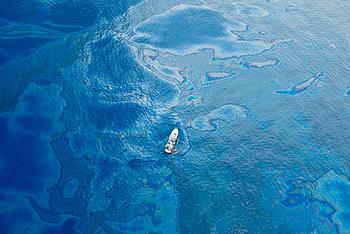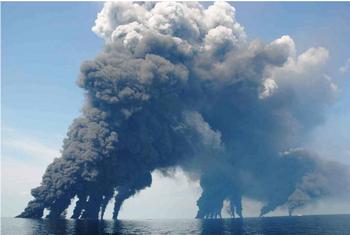Gulf Oil Spill Commission: Safety not Sacrificed to Save Money
WASHINGTON, DC, November 10, 2010 (ENS) – The BP oil rig explosion and spill in the Gulf of Mexico were caused by a “suite of bad decisions” and a “culture of complacency” rather than deliberate cutting of corners to save money, the presidential commission investigating the disaster said Tuesday.
In its preliminary technical conclusions the commission said, “No evidence at this time to suggest that there was a conscious decision to sacrifice safety concerns to save money.”
 |
Response vessels spray water on BP’s burning Deepwater Horizon oil rig, April 21, 2010. (Photo courtesy U.S. Coast Guard) |
“Presentations and examinations yesterday uncovered a suite of bad decisions,” said the commission’s co-chairman, William Reilly, “failed cement tests, premature removal of muds underbalancing the well, a negative pressure test that failed but was adjudged a success, apparent inattention, distraction or misreading of a key indicator that gas was rising toward the rig.”
“Our investigative team did not ascribe motive to any of those decisions and reported that they found no evidence that those flawed decisions were made to save money,” said Reilly, who headed the U.S. Environmental Protection Agency under President George H.W. Bush.
Yet, testimony before a joint U.S. Coast Guard-Bureau of Ocean Energy Management, Regulation and Enforcement panel, showed that the Macondo well was nearly $60 million over budget just a few days before the explosion.
“They didn’t rule out cost, just said they weren’t prepared to attribute mercenary motives to men who cannot speak for themselves because they are not alive,” said Reilly of the panel’s investigators. “But the story they told is ghastly: one bad call after another.”
These bad calls led to the April 20 explosion aboard the Deepwater Horizon that killed 11 crewmembers and injured 17 others. Before the damaged wellhead was finally capped on July 19 and sealed in September, more than 4.9 million barrels of oil gushed out a mile below the surface of the gulf, the biggest offshore oil spill in U.S. history.
 |
Oil slick from the Deepwater Horizon spreads across the Gulf of Mexico, June 2010. (Photo by Kris Krug) |
BP leased the Deepwater Horizon oil rig from Transocean and had completed but not sealed its test well, called the Macondo well, about 41 miles offshore Louisiana on Mississippi Canyon block 252, when the explosion occurred.
Halliburton had pumped a cement mixture down the well to seal it, but a report by the commission’s lead counsel and chief investigator, attorney Fred H. Bartlit, Jr., last month showed that Halliburton’s cement mixture was unstable. Bartlit said his job is not to lay blame, but to report what happened aboard the Deepwater Horizon.
During the commission’s hearing Monday, BP Vice President Mark Bly said Halliburton officials were slow about testing the cement and providing test results to BP.
Reilly said, “BP, Halliburton and Transocean are major respected companies operating throughout the Gulf and the evidence is they are in need of top-to-bottom reform.”
“We are aware of what appeared to be a rush to completion at Macondo, and one must ask whether the drive came from that made people determine they couldn’t wait for sound cement, or the right centralizers. We know a safety culture must be led from the top, and permeate a company,” Reilly said.
Commission co-chairman Bob Graham, a former U.S. senator and governor of Florida, agreed. “The problem here is that there was a culture that did not promote safety and that culture failed,” he said. “Leaders did not take serious risks seriously enough and did not identify a risk that proved to be fatal.”
Graham said “a series of almost inexplicable failures” took place in the hours, days and weeks leading up to the disaster.
“To just select one,” said Graham, “the fact that there were three different temporary abandonment plans adopted in the week before the final execution of the plan is illustrative of the fact that the lack of consistent planning for safety.”
 |
Smoke plumes from oil spill response crews gathering and burning oil in the Gulf of Mexico near the site of BP’s leaking Macondo well. June 22, 2010. (Photo by Dr. Oscar Garcia of Florida State University) |
Graham said he worries about one question that is still unanswered, “Why was the date April 20 such a committed date?”
The commission still has not heard the results of a forensic examination being conducted on the blowout preventer, a complex stack of valves at the wellhead that failed to prevent the explosion.
At Monday’s hearing to present the preliminary findings of the commission’s investigation, Bartlit expressed his dismay that the commission has not been granted subpoena power by Congress.
U.S. Representatives Ed Markey of Massachusetts and Lois Capps of California, both Democrats, urged Senate Republicans to stop blocking legislation giving subpoena power to the commission from coming to the Senate floor for a vote. The House passed Capps’ bill granting subpoena power back in June.
“It is clear after hearing Mr. Bartlit’s testimony that without subpoena power the oil spill commission is operating without all of the tools it needs to conduct a thorough investigation of BP’s disaster,” said Capps. “It’s really astonishing that Senate Republicans have not allowed a bill that passed the House nearly unanimously to even come to the floor for the vote. They need to stop defending Big Oil and allow this bill to come to the floor when Congress returns to Washington next week,” she said.
“Every day that Senate Republicans block subpoena power for the independent commission is another day BP, Halliburton and Transocean can duck and dodge the panel’s hardest questions,” said Markey. “The commission has already shown its value, and Senate Republicans should stop protecting the companies responsible for the spill by preventing the pursuit of the truth in this disaster.”
Reilly said the commission is looking “beyond the rig to the months and years before.”
“BP has been notoriously challenged on matters of process safety,” he said.
In two separate oil disasters before the Deepwater Horizon explosion, 30 BP workers have been killed, and more than 200 others injured.
In the past five years, BP has admitted to breaking U.S. environmental and safety laws and committing fraud. The company has paid $373 million in fines to the U.S. government.
In 2007, a BP pipeline spill poured 200,000 gallons of crude oil into the Alaska wilderness. Investigators determined that BP was aware of corrosion along the pipeline where the leak occurred but did not act to prevent a spill. The company paid $12 million in criminal fines for the spill, as well as $4 million to the state of Alaska.
After a 2005 BP refinery explosion in Texas City, Texas that killed 15 people and injured 170, a Justice Department investigation found that the explosion was caused by “improperly released vapor and liquid.” Safety procedures required by the Clean Air Act to guard against such an explosion either were not followed, or had not been established at the refinery.
And BP did not correct the problems at the Texas City refinery. Last October, the Department of Labor’s Occupational Safety and Health Administration fined the company $87 million because it failed to correct the safety problems – the largest fine in OSHA history.
BP said November 2 that the company is again in the black after a total charge of $39.9 billion for the Gulf of Mexico oil spill to the end of the third quarter.
The costs reflected “a delay in completing the relief well that finally sealed the Macondo well in September, additional mandated costs for decontaminating and demobilising vessels involved in the response, claims centre administration costs and additional legal costs,” the company said in a statement.
“These results demonstrate that BP is well on track for recovery after the tragic accident on the Deepwater Horizon drilling rig and subsequent oil spill,” commented BP Group chief executive Bob Dudley. “We have made good progress during the quarter. This strong operating performance shows the determination of everyone at BP to move the company forward and rebuild confidence after the terrible events of the past six months.”
Dudley, who took over as BP CEO in October, said the company is upgrading its safety practices, “creating a powerful Safety and Operational Risk function and restructuring the upstream segment – to ensure that safety and risk management are embedded as the absolute priority for every operation, for every person, throughout BP.”
Copyright Environment News Service (ENS) 2010. All rights reserved.
